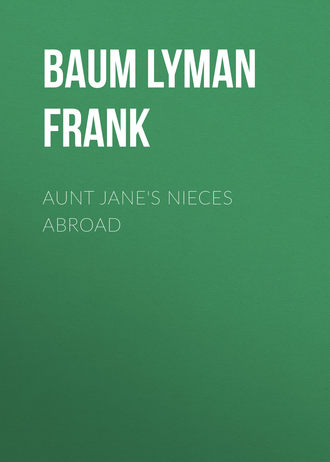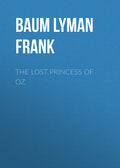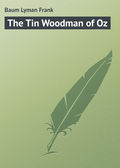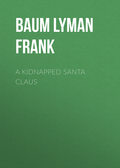
Лаймен Фрэнк Баум
Aunt Jane's Nieces Abroad
CHAPTER XV
DAYS OF ANXIETY
Uncle John's nieces passed a miserable night. Patsy stole into his room and prayed fervently beside his bed that her dear uncle might be preserved and restored to them in health and safety. Beth, meantime, paced the room she shared with Patsy with knitted brows and flashing eyes, the flush in her cheeks growing deeper as her anger increased. An ungovernable temper was the girl's worst failing; the abductors of her uncle were arousing in her the most violent passions of which she was capable, and might lead her to adopt desperate measures. She was only a country girl, and little experienced in life, yet Beth might be expected to undertake extraordinary things if, as she expressed it, if she "got good and mad!"
No sound was heard during the night from the room occupied by Louise, but the morning disclosed a white, drawn face and reddened eyelids as proof that she had rested as little as her cousins.
Yet, singularly enough, Louise was the most composed of the three when they gathered in the little sitting room at daybreak, and tried earnestly to cheer the spirits of her cousins. Louise never conveyed the impression of being especially sincere, but the pleasant words and manners she habitually assumed rendered her an agreeable companion, and this faculty of masking her real feelings now stood her in good stead and served to relieve the weight of anxiety that oppressed them all.
Frascatti came limping back with his tired followers in the early dawn, and reported that no trace of the missing man had been observed. There were no brigands and no Mafia; on that point all his fellow townsmen agreed with him fully. But it was barely possible some lawless ones who were all unknown to the honest Taorminians had made the rich American a prisoner.
Il Duca? Oh, no, signorini! A thousand times, no. Il Duca was queer and unsociable, but not lawless. He was of noble family and a native of the district. It would be very wrong and foolish to question Il Duca's integrity.
With this assertion Frascatti went to bed. He had not shirked the search, because he was paid for it, and he and his men had tramped the mountains faithfully all night, well knowing it would result in nothing but earning their money.
On the morning train from Catania arrived Silas Watson and his young ward Kenneth Forbes, the boy who had so unexpectedly inherited Aunt Jane's fine estate of Elmhurst on her death. The discovery of a will which gave to Kenneth all the property their aunt had intended for her nieces had not caused the slightest estrangement between the young folks, then or afterward. On the contrary, the girls were all glad that the gloomy, neglected boy, with his artistic, high-strung temperament, would be so well provided for. Without the inheritance he would have been an outcast; now he was able to travel with his guardian, the kindly old Elmhurst lawyer, and fit himself for his future important position in the world. More than all this, however, Kenneth had resolved to be a great landscape painter, and Italy and Sicily had done much, in the past year, to prepare him for this career.
The boy greeted his old friends with eager delight, not noticing for the moment their anxious faces and perturbed demeanor. But the lawyer's sharp eyes saw at once that something was wrong.
"Where is John Merrick?" he asked.
"Oh, I'm so glad you've come!" cried Patsy, clinging to his hand.
"We are in sore straits, indeed, Mr. Watson," said Louise.
"Uncle John is lost," explained Beth, "and we're afraid he is in the hands of brigands."
Then she related as calmly as she could all that had happened. The relation was clear and concise. She told of their meeting with Valdi on the ship, of Count Ferralti's persistence in attaching himself to their party, and of Uncle John's discovery that the young man was posing under an assumed name. She did not fail to mention Ferralti's timely assistance on the Amalfi drive, or his subsequent devoted attentions to Louise; but the latter Beth considered merely as an excuse for following them around.
"In my opinion," said she, "we have been watched ever since we left America, by these two spies, who had resolved to get Uncle John into some unfrequented place and then rob him. If they succeed in their vile plot, Mr. Watson, we shall be humiliated and disgraced forever."
"Tut-tut," said he; "don't think of that. Let us consider John Merrick, and nothing else."
Louise protested that Beth had not been fair in her conclusions. The Count was an honorable man; she would vouch for his character herself.
But Mr. Watson did not heed this defense. The matter was very serious – how serious he alone realized – and his face was grave indeed as he listened to the descriptions of that terrible Il Duca whom the natives all shrank from and refused to discuss.
When he had learned all the nieces had to tell he hastened into the town and telegraphed the American consul at Messina. Then he found the questura, or police office, and was assured by the officer in attendance that the disappearance of Mr. Merrick was already known to the authorities and every effort was being made to find him.
"Do you think he has been abducted by brigands?" asked the lawyer.
"Brigands, signore?" was the astonished reply. "There are no brigands in this district at all. We drove them out many years ago."
"How about Il Duca?"
"And who is that, signore?"
"Don't you know?"
"I assure you we have no official knowledge of such a person. There are dukes in Sicily, to be sure; but 'Il Duca' means nothing. Perhaps you can tell me to whom you refer?"
"See here," said the lawyer, brusquely; "I know your methods, questore mia, but they won't prove effective in this case. If you think an American is helpless in this country you are very much mistaken. But, to save time, I am willing to submit to your official requirements. I will pay you well for the rescue of my friend."
"All shall be done that is possible."
"But if you do not find him at once, and return him to us unharmed, I will have a regiment of soldiers in Taormina to search your mountains and break up the bands of brigands that infest them. When I prove that brigands are here and that you were not aware of them, you will be disgraced and deposed from your office."
The official shrugged his shoulders, a gesture in which the Sicilian is as expert as the Frenchman.
"I will welcome the soldiery," said he; "but you will be able to prove nothing. The offer of a reward may accomplish more – if it is great enough to be interesting."
"How great is that?"
"Can I value your friend? You must name the reward yourself. But even then I can promise nothing. In the course of our duty every effort is now being made to find the missing American. But we work in the dark, as you know. Your friend may be a suicide; he may have lost his mind and wandered into the wilderness; he may have committed some crime and absconded. How do I know? You say he is missing, but that is no reason the brigands have him, even did brigands exist, which I doubt. Rest assured, signore, that rigid search will be made. It is my boast that I leave no duty unfulfilled."
Mr. Watson walked back to the telegraph office and found an answer to his message. The American consul was ill and had gone to Naples for treatment. When he returned, his clerk stated, the matter of the disappearance of John Merrick would immediately be investigated.
Feeling extremely helpless and more fearful for his friend than before, the lawyer returned to the hotel for a conference with the nieces.
"How much of a reward shall I offer?" he asked. "That seems to be the only thing that can be depended upon to secure results."
"Give them a million – Uncle John won't mind," cried Patsy, earnestly.
"Don't give them a penny, sir," said Beth. "If they are holding him for a ransom Uncle is in no personal danger, and we have no right to assist in robbing him."
"But you don't understand, my dear," asserted the lawyer. "These brigands never let a victim go free unless they are well paid. That is why they are so often successful. If John Merrick is not ransomed he will never again be heard of."
"But this is not a ransom, sir. You propose to offer a reward to the police."
"Let me explain. The ways of the Italian police are very intricate. They know of no brigandage here, and cannot find a brigand. But if the reward is great enough to divide, they know where to offer a share of it, in lieu of a ransom, and will force the brigands to accept it. In that way the police gets the glory of a rescue and a share of the spoils. If we offer no reward, or an insignificant one, the brigands will be allowed to act as they please."
"That is outrageous!" exclaimed Beth.
"Yes. The Italian government deplores it. It is trying hard to break up a system that has existed for centuries, but has not yet succeeded."
"Then I'd prefer to deal directly with the brigands."
"So would I, if – "
"If what, sir?"
"If we were sure your uncle is in their hands. Do you think the party you sent out last night searched thoroughly?"
"I hope so."
"I will send out more men at once. They shall search the hills in every direction. Should they find nothing our worst fears will be confirmed, and then – "
"Well, Mr. Watson?"
"Then we must wait for the brigands to dictate the terms of a ransom, and make the best bargain we can."
"That seems sensible," said Kenneth, and both Patsy and Louise agreed with him, although it would be tedious waiting.
But Beth only bit her lip and frowned.
Mr. Watson's searching party was maintained all day – for two days, and three; but without result. Then they waited for the brigands to act. But a week dragged painfully by and no word of John Merrick's whereabouts reached the ears of the weary watchers.
CHAPTER XVI
TATO
When Uncle John passed through the west gate for a tramp along the mountain paths he was feeling in an especially happy and contented mood. The day was bright and balmy, the air bracing, the scenery unfolded step by step magnificent and appealing. To be in this little corner of the old world, amid ruins antedating the Christian era, and able to wholly forget those awful stock and market reports of Wall street, was a privilege the old gentleman greatly appreciated.
So away he trudged, exploring this path or that leading amongst the rugged cliffs, until finally he began to take note of his erratic wanderings and wonder where he was. Climbing an elevated rock near the path he poised himself upon its peak and studied the landscape spread out beneath him.
There was a patch of sea, with the dim Calabrian coast standing sentry behind it. The nearer coast was hidden from view, but away at the left was a dull white streak marking the old wall of Taormina, and above this the ruined citadel and the ancient castle of Mola – each on its separate peak.
"I must be getting back," he thought, and sliding down the surface of the rock he presently returned to the path from whence he had climbed.
To his surprise he found a boy standing there and looking at him with soft brown eyes that were both beautiful and intelligent. Uncle John was as short as he was stout, but the boy scarcely reached to his shoulder. He was slender and agile, and clothed in a grey corduroy suit that was better in texture than the American had seen other Sicilian youths wear. As a rule the apparel of the children in this country seemed sadly neglected.
Yet the most attractive thing about this child was his face, which was delicate of contour, richly tinted to harmonize with his magnificent brown eyes, and so sensitive and expressive that it seemed able to convey the most subtle shades of emotion. He seemed ten or twelve years of age, but might have been much older.
As soon as the American had returned to the path the boy came toward him in an eager, excited way, and exclaimed:
"Is it not Signor Merrick?"
The English was fluent, and only rendered softer by the foreign intonation.
"It is," said Uncle John, cheerfully. "Where did you drop from, my lad? I thought these hills were deserted, until now."
"I am sent by a friend," answered the boy, speaking rapidly and regarding the man with appealing glances. "He is in much trouble, signore, and asks your aid."
"A friend? Who is it?"
"The name he gave me is Ferralti, signore. He is near to this place, in the hills yonder, and unable to return to the town without assistance."
"Ferralti. H-m-m. Is he hurt?"
"Badly, signore; from a fall on the rocks."
"And he sent for me?"
"Yes, signore. I know you by sight – who does not? – and as I hurried along I saw you standing on the rock. It is most fortunate. Will you hasten to your friend, then? I will lead you to him."
Uncle John hesitated. He ought to be getting home, instead of penetrating still farther into these rocky fastnesses. And Ferralti was no especial friend, to claim his assistance. But then the thought occurred that this young Italian had befriended both him and his nieces in an extremity, and was therefore entitled to consideration when trouble in turn overtook himself. The natural impulse of this thought was to go to his assistance.
"All right, my lad," said he. "Lead on, and I'll see what can be done for Ferralti. Is it far?"
"Not far, signore."
With nervous, impatient steps the child started up the narrow path and Uncle John followed – not slowly, but scarcely fast enough to satisfy his zealous guide.
"What is your name, little one?"
"Tato, signore."
"Where do you live?"
"Near by, signore."
"And how did you happen to find Ferralti?"
"By chance, signore."
Uncle John saved his remaining breath for the climb. He could ask questions afterward.
The path was in a crevasse where the rocks seemed once to have split. It was narrow and steep, and before long ended in a cul de sac. The little man thought they had reached their destination, then; but without hesitation the boy climbed over a boulder and dropped into another path on the opposite side, holding out a hand to assist the American.
Uncle John laughed at the necessity, but promptly slid his stout body over the boulder and then paused to mop his brow.
"Much farther, Tato?"
"Just a step, signore."
"It is lucky you found Ferralti, or he might have died in these wilds without a soul knowing he was here."
"That is true, signore."
"Well, is this the path?"
"Yes, signore. Follow me, please."
The cliffs were precipitous on both sides of them. It was another crevasse, but not a long one. Presently the child came to a halt because the way ended and they could proceed no farther. He leaned against the rock and in a high-pitched, sweet voice sang part of a Sicilian ditty, neither starting the verse nor ending it, but merely trilling out a fragment.
Uncle John regarded him wonderingly; and then, with a sudden suspicion, he demanded:
"You are not playing me false, Tato?"
"I, signore?" smiling frankly into the man's eyes; "you need never fear Tato, signore. To be your friend, and Signor Ferralti's friend, makes me very proud."
The rock he leaned against fell inward, noiselessly, and disclosed a passage. It was short, for there was light at the other end.
The strange child darted in at once.
"This way, signore. He is here!"
Uncle John drew back. He had forgotten until now that these mountains are dangerous. And something strange in the present proceedings, the loneliness of the place and the elfish character of his guide, suddenly warned him to be cautious.
"See here, my lad," he called: "I'll go no farther."
Instantly Tato was at his side again, grasping the man's hand in his tiny brown one and searching his face with pleading eyes.
"Ah, signore, you will not fail your friend, when he is so near you and in such great trouble? See! I who am a stranger and not even his countryman, even I weep for the poor young man, and long to comfort him. Do you, his friend, refuse him aid because you have fear of the wild mountains and a poor peasant boy?"
Tears really stood in the beautiful brown eyes. They rolled down his cheeks, as with both hands he pressed that of Uncle John and urged him gently forward.
"Oh, well; lead on, Tato. I'll see the other side of your tunnel, anyhow. But if you play me tricks, my lad – "
He paused, for a wonderful vision had opened before him. Coming through the short passage hewn in the rocks the American stood upon a ledge facing a most beautiful valley, that was hemmed in by precipitous cliffs on every side. From these stern barriers of the outside world the ground sloped gradually toward the center, where a pretty brook flowed, its waters sparkling like diamonds in the sunlight as it tumbled over its rocky bed. Groves of oranges and of olive, lemon and almond trees occupied much of the vale, and on a higher point at the right, its back to the wall of rock that towered behind it, stood a substantial yet picturesque mansion of stone, with several outbuildings scattered on either side.
The valley seemed, indeed, a toy kingdom sequestered from the great outside world, yet so rich and productive within itself that it was independent of all else.
Uncle John gazed with amazement. Who could have guessed this delightful spot was hidden safe within the heart of the bleak, bare mountain surrounding it? But suddenly he bethought himself.
"What place is this, Tato?" he asked; "and where is our friend Ferralti, who needs me?"
There was no reply.
He turned around to find the boy had disappeared. Moreover, the passage had disappeared. Only a wall of rock was behind him, and although his eyes anxiously searched the rifts and cracks of its rough surface, no indication of the opening through which he had passed could be discovered.
CHAPTER XVII
THE HIDDEN VALLEY
Uncle John's first inspiration was to sit down upon a stone to think. He drew out his pipe and lighted it, to assist his meditations.
These were none too pleasant. That he had been cleverly entrapped, and that by a child scarcely in its teens, was too evident to need reflection. And what a secure trap it was! The mountains ranged all around the valley were impossible to scale, even by an Alpine climber, and to one who was not informed of its location the existence of the valley itself was unimaginable.
"I had not believed Ferralti was so shrewd," he muttered, wonderingly. "That something was wrong about the fellow I knew, of course; but I had not suspected such a thing as this. Now, then, first of all let me mark this spot, so that I will remember it. Just back of where I now stand is the entrance or outlet to the tunnel through the wall. It is closed, I suppose, by a swinging stone, like the one on the opposite side. I saw that one opened – opened by some person concealed from view, as soon as the boy sang his bit of song which was the signal agreed upon. And I was fool enough, after that warning, to walk straight through the tunnel! You're getting old, John Merrick; that's the only way I can account for your folly. But Ferralti hasn't won the odd trick yet, and if I keep my wits about me he isn't likely to win."
Thus ruminating, Uncle John searched the rocky wall carefully and believed he would know the place again, although which of the rough stones of its surface formed the doorway to the tunnel he could not guess.
A ledge of rock served as a path leading to right and left around this end of the valley, or "pocket" in the mountain, as it could more properly be called. Uncle John turned to the right, striding along with his usual deliberation, smoking his pipe and swinging his cane as he approached the stone dwelling that formed the center of the little settlement. As yet no sign of human life had he observed since Tato had disappeared, although a few cows were standing in a green meadow and some goats scrambled among the loose rocks at the further end of the enclosure.
Around the house the grounds had been laid out in gardens, with flowers and shrubbery, hedges and shade trees scattered about. Chickens clucked and strutted along the paths and an air of restfulness and peace brooded over all.
Uncle John was plainly mystified until he drew quite close to the dwelling, which had many verandas and balconies and bore every evidence of habitation. Then, to his astonishment, he beheld the form of a man stretched lazily in a wicker chair beside the entrance, and while he paused, hesitating, the man sat up and bowed politely to him.
"Good morning, Signor Merreek."
It was Victor Valdi, or, ignoring the fictitious name, the mysterious personage known as "Il Duca."
"Behold my delight, Signor Merreek, to receive you in my poor home," continued the man. "Will you not be seated, caro amico?"
The words were soft and fair, but the dark eyes gleamed with triumph and a sneer curled the thin lips.
"Thank you," said Uncle John; "I believe I will."
He stepped upon the veranda and sat down opposite his host.
"I came to see Count Ferralti, who is hurt, I understand," he continued.
"It is true, signore, but not badly. The poor count is injured mostly in his mind. Presently you shall see him."
"No hurry," observed Uncle John. "Pleasant place you have here, Duke."
"It is very good of you to praise it, signore. It is my most ancient patrimony, and quite retired and exclusive."
"So I see."
"The house you have honored by your presence, signore, was erected some three hundred and thirty years ago, by an ancestor who loved retirement. It has been in my family ever since. We all love retirement."
"Very desirable spot for a brigand, I'm sure," remarked the American, puffing his pipe composedly.
"Brigand? Ah, it pleases you to have humor, signore, mia. Brigand! But I will be frank. It is no dishonor to admit that my great ancestors of past centuries were truly brigands, and from this quiet haven sallied forth to do mighty deeds. They were quite famous, I am told, those olden Dukes d'Alcanta."
"I do not question it."
"Our legends tell of how my great ancestors demanded tribute of the rich who passed through their domain – for all this end of Sicily was given to us by Peter of Aragon, and remained in our possession until the second Ferdinand robbed us of it. Those times were somewhat wild and barbarous, signore, and a gentleman who protected his estates and asked tribute of strangers was termed a brigand, and became highly respected. But now it is different. We are civilized and meek, and ruled most lovingly by Italy. They will tell you there is no brigandage in all Sicily."
"So I understand."
"To-day I am nobody. My very name is forgotten. Those around this mountain know nothing of my little estate, and I am content. I desire not glory: I desire not prominence; to live my life in seclusion, with the occasional visit of a friend like yourself, is enough to satisfy me."
"You seem well known in Taormina."
"Quite a mistake, signore."
"And the natives must have climbed these peaks at times and looked down into your secluded kingdom."
"If so, they have forgotten it."
"I see."
"I give to the churches and the poor, but in secret. If I have an enemy, he disappears – I do not know how; no one knows."
"Of course not. You are an improvement on your ancestors, Duke. Instead of being a brigand you belong to the Mafia, and perform your robberies and murders in security. Very clever, indeed."
"But again you are wrong, signore," replied the Duke, with a frown. "I have never known of this Mafia, of which you speak, nor do I believe it exists. For myself, I am no robber, but a peaceful merchant."
"A merchant?" returned Uncle John, surprised by the statement.
"To be sure. I have some ancient and very valuable relics in my possession, treasured most carefully from the mediæval days. These I sell to my friends – who are fortunately all foreigners like yourself and can appreciate such treasures – and so obtain for myself and my family a modest livelihood."
"And you expect to sell something to me?" asked Uncle John, understanding very well the Sicilian's meaning.
"It is my earnest hope, signore."
The American fell silent, thinking upon the situation. The fierce looking brigand beside him was absurd enough, in his way, but doubtless a dangerous man to deal with. Uncle John was greatly interested in the adventure. It was such a sharp contrast to the hum-drum, unromantic American life he had latterly known that he derived a certain enjoyment from the novel experience. If the girls did not worry over his absence he would not much regret his visit to Il Duca's secluded valley.
It was already midday, and his nieces would be expecting him to luncheon. When he did not appear they would make enquiries, and try to find him. It occurred to him how futile all such attempts must prove. Even to one acquainted with the mountain paths the entrance to the duke's domain was doubtless a secret, and the brigand had plainly hinted that the native Sicilians were too cautious to spy upon him or molest him in any way.
So far, the only person he had seen was Il Duca himself. The child who had decoyed him was, of course, somewhere about, and so also was Ferralti. How many servants or followers the brigand might have was as yet a mystery to the new arrival.
In the side pocket of Uncle John's loose coat lay a loaded revolver, which he had carried ever since he had received Mr. Watson's warning letter. He had never imagined a condition of danger where he could not use this weapon to defend himself, and as long as it remained by him he had feared nothing. But he had been made a prisoner in so deft a manner that he had no opportunity to expostulate or offer any sort of resistance. Later there might be a chance to fight for his liberty, and the only sensible action was to wait and bide his time.
"For example," the Duke was saying, in his labored, broken English, "I have here a priceless treasure – very antique, very beautiful. It was in one time owned by Robert the Norman, who presented it to my greatest ancestor."
He drew an odd-shaped ring from his pocket and handed it to the American. It was of dull gold and set with a half dozen flat-cut garnets. Perhaps antique; perhaps not; but of little intrinsic value.
"This ring I have decided to sell, and it shall be yours, Signor Merreek, at a price far less than is represented by its historic worth. I am sure you will be glad to buy it."
"For how much?" asked Uncle John, curiously.
"A trifle; a mere hundred thousand lira."
"Twenty thousand dollars!"
"The ring of King Roger. How cheap! But, nevertheless, you shall have it for that sum."
Uncle John smiled.
"My dear Duke," he replied, "you have made a sad mistake. I am a comparatively poor man. My fortune is very modest."
The brigand lay back in his chair and lighted a fresh cigarette.
"I fear you undervalue yourself, my dear guest," he said. "Recently have I returned from America, where I was told much of the wealth of Signor John Merreek, who is many times a millionaire. See," drawing a paper from his pocket, "here is a list of the stocks and securities you own. Also of government and railway bonds, of real estate and of manufactures controlled by your money. I will read, and you will correct me if an error occurs."
Uncle John listened and was amazed. The schedule was complete, and its total was many millions. It was a better list of holdings than Uncle John possessed himself.
"You foreigners make queer mistakes, Duke," said he, taking another tack. "This property belongs to another John Merrick. It is a common name, and that is doubtless why you mistook me for the rich John Merrick."
"I have noticed," returned the Duke, coldly, "that this strange delusion of mind is apt to overtake my guests. But do not be alarmed; it will pass away presently, and then you will realize that you are yourself. Remember that I crossed the Atlantic on your steamship, signore. Many people there on board spoke of you and pointed you out to me as the great man of finance. Your own niece that is called Patsy, she also told me much about you, and of your kindness to her and the other young signorini. Before I left New York a banker of much dignity informed me you would sail on the ship 'Princess Irene.' If a mistake has been made, signore, it is yours, and not mine. Is your memory clearer now?"
Uncle John laughed frankly. The rascal was too clever for him to dispute with.
"Whoever I am," said he, "I will not buy your ring."
"I am pained," replied the brigand, lightly. "But there is ample time for you to reflect upon the matter. Do not decide hastily, I implore you. I may have been too liberal in making my offer, and time may assist me in fixing a just price for the relic. But we have had enough of business just now. It is time for our midday collation. Oblige me by joining us, signore."
He blew a shrill whistle, and a man stepped out of a doorway. He was an enormous Sicilian, tall, sinewy and with a countenance as dark and fierce as his master's. In his belt was a long knife, such as is known as a stilleto.
"Tommaso," said the Duke, "kindly show Signor Merreek to his room, and ask Guido if luncheon is ready to be served."
"Va bene, padrone," growled the man, and turned obediently to escort the American.
Uncle John entered the house, traversed a broad and cool passage, mounted to the second floor and found himself in a pleasant room with a balcony overlooking the valley. It was comfortably furnished, and with a bow that was not without a certain grim respect the man left him alone and tramped down the stairs again. There had been no attempt to restrain his liberty or molest him in any way, yet he was not slow to recognize the fact that he was a prisoner. Not in the house, perhaps, but in the valley. There was no need to confine him more closely. He could not escape.
He bathed his hands and face, dried them on a fresh towel, and found his toilet table well supplied with conveniences. In the next room some one was pacing the floor like a caged beast, growling and muttering angrily at every step.
Uncle John listened. "The brigand seems to have more than one guest," he thought, and smiled at the other's foolish outbursts.







